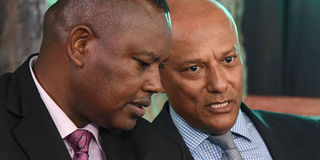Lumping investigation powers in one agency will have reverse effect

Director of Criminal Investigations George Kinoti (left) indulges Ethics and Anti-Corruption Commission chief executive officer Twalib Mbarak in a conversation during the anti-corruption conference at Bomas of Kenya on January 24, 2019. PHOTO | FILE | NATION MEDIA GROUP
What you need to know:
- The EACC has been in existence for a quarter of a century but corruption has only got worse.
- There is scanty evidence that centralising anti-corruption activities reduces graft and plenty that it achieves the opposite.
- The 2018 Corruption Perception Index, the most widely known such metric, shows Kenya lagging near the bottom of the list at position 145.
Some politicians have questioned the role of the Directorate of Criminal Investigations in the ongoing war on corruption, saying, that is the sole province of the Ethics and Anti-Corruption Commission.
They propose a proud new science of fighting graft: Prohibit by force of law anyone other than the EACC from investigating corruption.
It is normal to lace one’s views with legalistic jargon about “the Constitution” and “the constitutive Acts”, and create more heat than light. There are simpler, earthly arguments against this idea of a single agency with absolute monopoly fighting corruption.
CORRUPTION
The EACC has been in existence for a quarter of a century but corruption has only got worse. There is scanty evidence that centralising anti-corruption activities reduces graft and plenty that it achieves the opposite.
The 2018 Corruption Perception Index, the most widely known such metric, shows Kenya lagging near the bottom of the list at position 145, worse than such relative bastions of integrity as Albania and Lesotho. In 1996, when EACC’s ancestor, KACA, was created, Kenya was better, at 52, and is yet to break that record.
Countries that are serious about fighting corruption do not even have EACC-type agencies. Out of the 20 least-corrupt countries, only two have them: Singapore and Hong Kong, at number 3 and 14, respectively. All 50 most-corrupt countries have centralised agencies.
CRIMES
By far the most improved in the last decade, Belarus rose from number 150 in 2007 to 70 in 2018. The former Soviet republic does not have a centralised anti-graft body and counter-corruption activities are under The State Forensic Examination Committee, which coordinates investigations for all sorts of crimes, much like DCI.
Rwanda, which jumped from position 121 in 2006 to 48 in 2018, has an Ombudsman, who has just six staff to liaise with the police during investigations.
These facts strongly suggest that, if you want to fight corruption effectively, centralising the activities is just the thing you don’t do.
The model was proliferated across the world through pressure from donors in the 1990s. Many developing countries were railroaded into creating these agencies as a condition for aid.
DEVELOPED
It is a cookie-cutter idea copy-pasted from Singapore and Hong Kong and prescribed to all developing countries by Western governments.
Apparently, what worked decades ago in tiny, highly developed, wealthy Asian islands was supposed to automatically work in huge, diverse, underdeveloped countries with limited infrastructure and totally different societies, cultures and self-organising behaviours.
The creation of these agencies on these islands was the result of serious introspection, driven by severe domestic crises that almost brought down the countries. Hong Kong established the Independent Commission against Corruption (Icac) in 1974, driven by the Peter Godber affair.
Singapore started the Corrupt Practices Investigation Bureau (CPIB) in 1952, when the opium hijacking case implicated senior police officers and threatened the legitimacy of the government.
FAILED
In Kenya and other developing countries, hand-me-down counter-corruption strategies from alien lands quarter-backed by foreign experts, and cynically exploited by politicians, have failed and will keep failing.
We have to design our own strategies to fight this scourge using tactics, techniques and procedures that take into account the uniqueness of our society, history, culture, system and people.
The logical thing to do is to distribute responsibilities to as many agencies as possible. It is easy to capture one agency; it requires an improbable conspiracy to capture half a dozen agencies. Let DCI, DPP, KRA, EACC et al fight corruption unhindered.
It doesn’t matter who lands the fatal blow as long as the graft monster lies dead in the end.
Mr Kuria is a risk consultant specialising in detection, prevention and disruption of complex transnational financial crime. [email protected]





